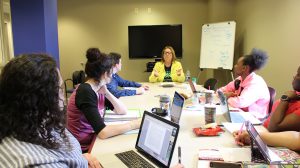
Susan Allen (center), director of the UM Master of Social Work program, discusses crisis counseling and domestic violence with her students. The program has moved up significantly in national rankings and is among the nation’s top 100 programs. UM photo by Sarah Sapp
OXFORD, Miss. – U.S. News and World Report has ranked the University of Mississippi’s graduate program in social work among the top 100 in the country, up an impressive 60 spots in the national rankings since the program started in 2011.
The latest report ranks the Master of Social Work at UM tied at No. 62 among the nation’s public universities.
Since 2014, the Department of Social Work grants and contracts have grown 111 percent. Faculty generated peer-reviewed articles are up 230 percent, and national and refereed faculty presentations have increased by 250 percent.
“The School of Applied Sciences has invested the resources needed to build and promote the Department of Social Work,” said Daphne Cain, department chair.
“We have hired nine tenure-track faculty from premier schools of social work across the U.S., and in collaboration with our more senior faculty, the more junior faculty have dedicated themselves to research, teaching and service that has translated into national visibility through scholarship, teaching and service. That positive national visibility translates into improved national rankings.”
Although thrilled to move up in the rankings, Susan Allen, director of the Master of Social Work program, points to other important indicators of success that reinforce those numbers.
“For example, Patricia Tortora, a 2015 graduate, was the only M.S.W. student selected for the Substance Abuse and Mental Health Services Administration Leadership Initiatives for Tomorrow Fellowship,” Allen said. “Based on a competitive nomination process, only 22 students were selected nationwide and 21 were Ph.D. students.
“I believe that is a quality measure based on a tangible indicator. Our 100 percent pass rate on the Licensed Master of Social Work exam last year is another tangible indicator of the quality of the program.”
Viktor Burlaka, assistant professor of social work, agreed that the infusion of faculty from some of the nation’s top programs has significantly enhanced the department’s teaching and research capacity.
“I feel proud that our students have the ability to learn from dynamic scholars with active research agendas,” Burlaka said. “Surrounded by caring and enthusiastic faculty, they thrive academically, develop critical thinking and hone their clinical skills to become competitive and successful social workers.”
Despite the incredible growth in enrollment – nearly doubling the number of full-time M.S.W. students from 2016 to 2017 – the department has purposely maintained a low student-to-faculty ratio, said Jandel Crutchfield, assistant professor of social work.
“The program has been able to maintain its small class sizes while expanding its reach and rigor,” Crutchfield said. “The rise in the rankings of our M.S.W. program reflects the concerted effort of our faculty and the exemplary students in each cohort.”
Maintaining that small class size and close-knit relationship between faculty and students is a major factor in student success, said Younghee Lim, associate professor of social work.
“I also think that the caring mentorship these talented faculty provide to the students increased retention and graduation rates, which contributed to the increased ranking,” Lim said.
Recent graduate Claire Griffin, of Decatur, said the program helped her grow both as a professional and as a person.
“The smaller classroom setting provided a positive environment for students to have healthy discussion on the variety of topics covered within this program,” Griffin said. “The relationships I built with teachers helped me to develop a confidence in myself and in my capacity to be a clinician that I never thought possible.
“The best takeaway I gained was the importance of taking the time to stay up-to-date with the latest research because delivering the best services for clients is, in part, a result of knowing this information.”
Consistent student success leads to consistent employment for graduates. In a 2016 employment survey conducted by the department as a part of its accreditation process, 89 percent of the program’s graduates found employment within six months of graduation – 25 percent in community mental health, 25 percent in aging/gerontology, 13 percent in child welfare, 13 percent in schools, 13 percent in nursing home/assisted living and 13 percent in in-patient mental health.
For more information about the Department of Social Work, visit http://sw.olemiss.edu/.